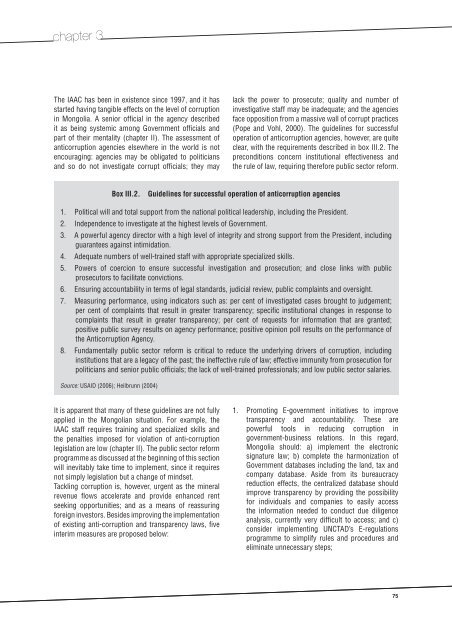UNCTAD-Mongolia
UNCTAD-Mongolia
UNCTAD-Mongolia
You also want an ePaper? Increase the reach of your titles
YUMPU automatically turns print PDFs into web optimized ePapers that Google loves.
chapter 3<br />
The IAAC has been in existence since 1997, and it has<br />
started having tangible effects on the level of corruption<br />
in <strong>Mongolia</strong>. A senior official in the agency described<br />
it as being systemic among Government officials and<br />
part of their mentality (chapter II). The assessment of<br />
anticorruption agencies elsewhere in the world is not<br />
encouraging: agencies may be obligated to politicians<br />
and so do not investigate corrupt officials; they may<br />
lack the power to prosecute; quality and number of<br />
investigative staff may be inadequate; and the agencies<br />
face opposition from a massive wall of corrupt practices<br />
(Pope and Vohl, 2000). The guidelines for successful<br />
operation of anticorruption agencies, however, are quite<br />
clear, with the requirements described in box III.2. The<br />
preconditions concern institutional effectiveness and<br />
the rule of law, requiring therefore public sector reform.<br />
Box III.2. Guidelines for successful operation of anticorruption agencies<br />
1. Political will and total support from the national political leadership, including the President.<br />
2. Independence to investigate at the highest levels of Government.<br />
3. A powerful agency director with a high level of integrity and strong support from the President, including<br />
guarantees against intimidation.<br />
4. Adequate numbers of well-trained staff with appropriate specialized skills.<br />
5. Powers of coercion to ensure successful investigation and prosecution; and close links with public<br />
prosecutors to facilitate convictions.<br />
6. Ensuring accountability in terms of legal standards, judicial review, public complaints and oversight.<br />
7. Measuring performance, using indicators such as: per cent of investigated cases brought to judgement;<br />
per cent of complaints that result in greater transparency; specific institutional changes in response to<br />
complaints that result in greater transparency; per cent of requests for information that are granted;<br />
positive public survey results on agency performance; positive opinion poll results on the performance of<br />
the Anticorruption Agency.<br />
8. Fundamentally public sector reform is critical to reduce the underlying drivers of corruption, including<br />
institutions that are a legacy of the past; the ineffective rule of law; effective immunity from prosecution for<br />
politicians and senior public officials; the lack of well-trained professionals; and low public sector salaries.<br />
Source: USAID (2006); Heilbrunn (2004)<br />
It is apparent that many of these guidelines are not fully<br />
applied in the <strong>Mongolia</strong>n situation. For example, the<br />
IAAC staff requires training and specialized skills and<br />
the penalties imposed for violation of anti-corruption<br />
legislation are low (chapter II). The public sector reform<br />
programme as discussed at the beginning of this section<br />
will inevitably take time to implement, since it requires<br />
not simply legislation but a change of mindset.<br />
Tackling corruption is, however, urgent as the mineral<br />
revenue flows accelerate and provide enhanced rent<br />
seeking opportunities; and as a means of reassuring<br />
foreign investors. Besides improving the implementation<br />
of existing anti-corruption and transparency laws, five<br />
interim measures are proposed below:<br />
1. Promoting E-government initiatives to improve<br />
transparency and accountability. These are<br />
powerful tools in reducing corruption in<br />
government-business relations. In this regard,<br />
<strong>Mongolia</strong> should: a) implement the electronic<br />
signature law; b) complete the harmonization of<br />
Government databases including the land, tax and<br />
company database. Aside from its bureaucracy<br />
reduction effects, the centralized database should<br />
improve transparency by providing the possibility<br />
for individuals and companies to easily access<br />
the information needed to conduct due diligence<br />
analysis, currently very difficult to access; and c)<br />
consider implementing <strong>UNCTAD</strong>’s E-regulations<br />
programme to simplify rules and procedures and<br />
eliminate unnecessary steps;<br />
75




